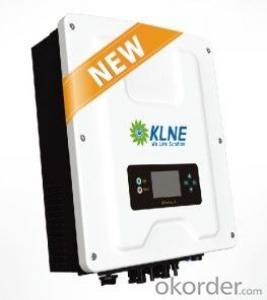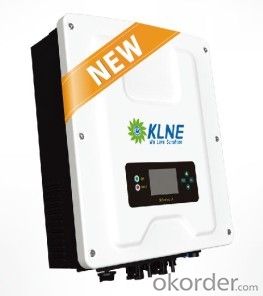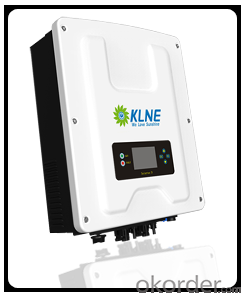Mppt Solar Inverter Solartec D 5000 On Grid Inverter with 2 MPPT WiFi
- Loading Port:
- Shanghai
- Payment Terms:
- TT OR LC
- Min Order Qty:
- -
- Supply Capability:
- 10000 set/month
OKorder Service Pledge
Quality Product, Order Online Tracking, Timely Delivery
OKorder Financial Service
Credit Rating, Credit Services, Credit Purchasing
You Might Also Like
Solartec D 2500,3000,3600,4000,4600,5000
2MPPT Trackers
online monitoring system by integrated WIFI
Integrated DC Switch
Comprehensive protection functions
Graphic display
High efficiency 97.5%
RS 485/RS 232/SolarLog Communication
5 Years warranty
G83,G59,VDE 4105,VDE 0126,CEI
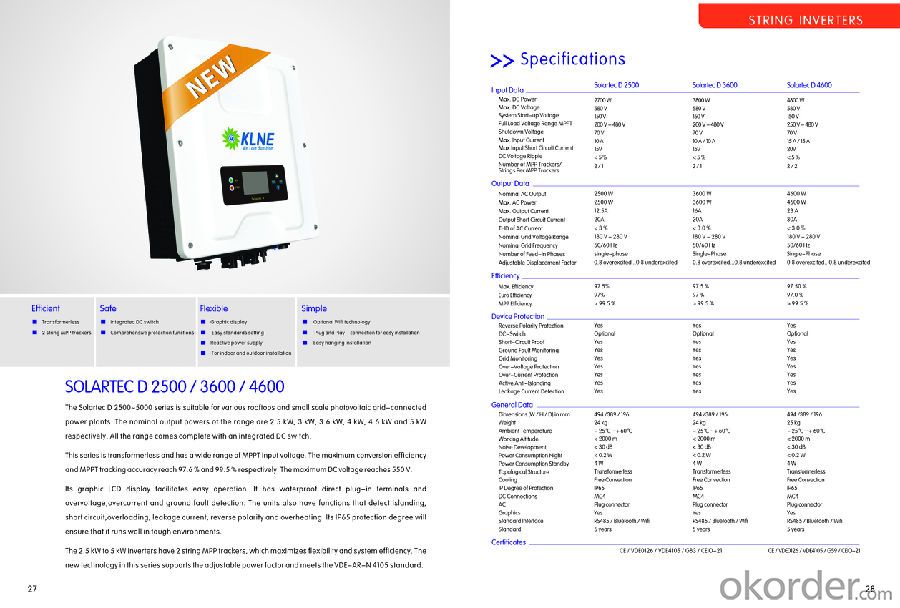
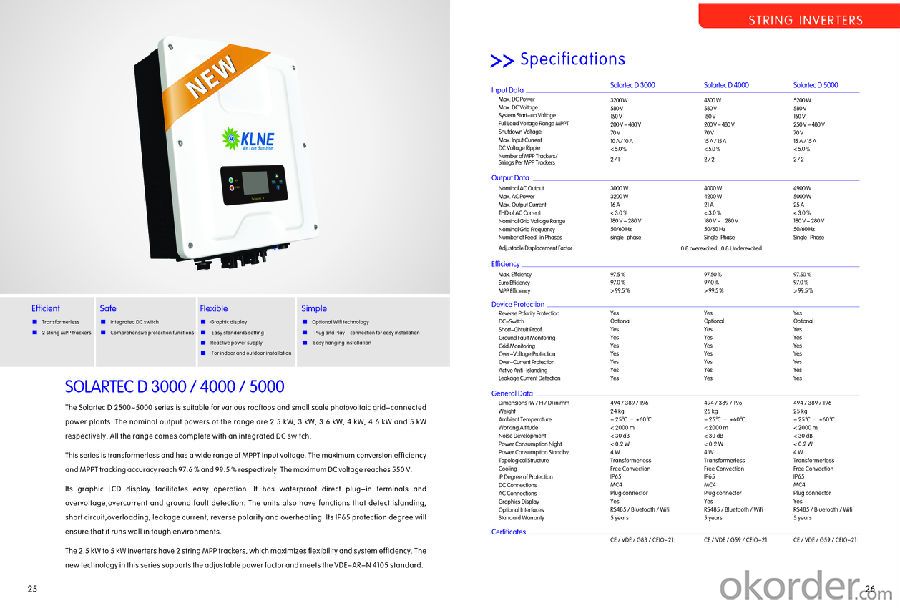
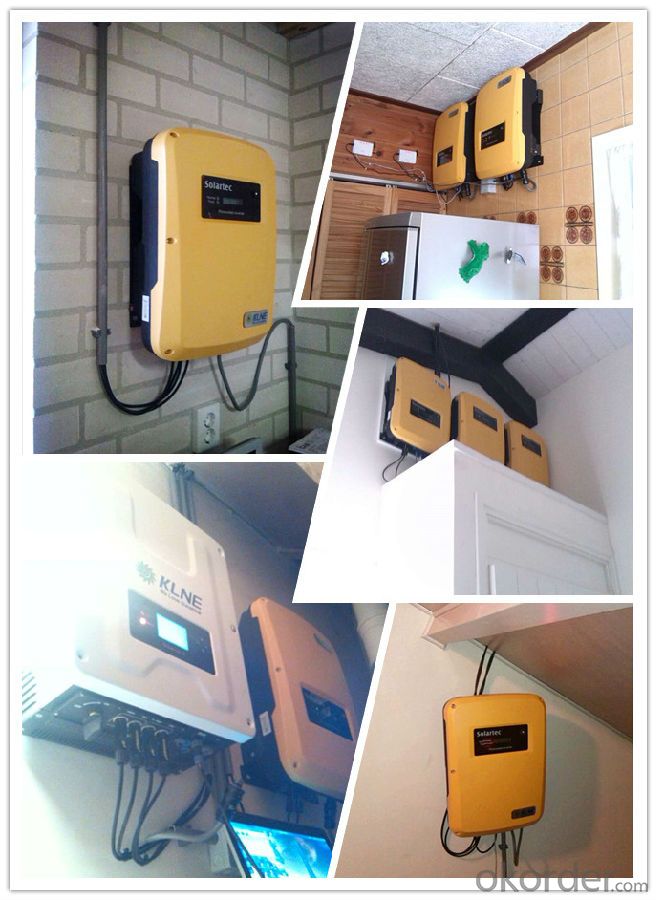
- Q: Can a solar inverter be used with a solar-powered backup generator?
- Yes, a solar inverter can be used with a solar-powered backup generator. A solar inverter is responsible for converting the DC (direct current) electricity generated by solar panels into AC (alternating current) electricity that can be used to power household appliances and other electrical devices. A solar-powered backup generator, on the other hand, uses solar energy to charge its batteries or store excess electricity. When the solar panels are generating electricity, the solar inverter will convert the DC electricity into AC electricity, which can be used directly in the household or sent back to the grid if the system is connected to it. If there is excess electricity being generated and the batteries of the solar-powered backup generator are fully charged, the solar inverter can divert the excess electricity to other loads or devices. During periods when solar energy is insufficient or not available, the solar-powered backup generator can kick in and provide the necessary electricity to power the house or recharge the batteries. In this case, the solar inverter will still be responsible for converting the DC electricity generated by the solar-powered backup generator into AC electricity. So, to summarize, a solar inverter can definitely be used with a solar-powered backup generator to ensure a continuous supply of electricity even when solar energy is limited.
- Q: How does a solar inverter protect against overvoltage and overcurrent?
- A solar inverter protects against overvoltage by continuously monitoring the voltage level of the solar panels. If the voltage exceeds a safe threshold, the inverter automatically limits the power output or shuts down temporarily to prevent damage to the system. Similarly, to protect against overcurrent, the inverter monitors the current flowing through the system. If the current exceeds a safe limit, the inverter adjusts the output power or shuts down to avoid overheating and potential electrical hazards.
- Q: Can a solar inverter be used in harsh weather conditions?
- Yes, solar inverters are designed to be used in harsh weather conditions. They are built to withstand extreme temperatures, high humidity, and heavy rain or snow. Additionally, they have protective features such as sealed enclosures and corrosion-resistant components to ensure reliable operation even in challenging weather environments.
- Q: How does a solar inverter handle voltage regulation during sudden load changes?
- A solar inverter handles voltage regulation during sudden load changes by continuously monitoring the voltage and current outputs from the solar panels. When there is a sudden increase or decrease in the load, the inverter adjusts its power output accordingly to maintain a stable and consistent voltage level. This is achieved through a combination of control algorithms and power electronics within the inverter, ensuring that the voltage remains within an acceptable range to meet the demands of the load.
- Q: Can a solar inverter be used with solar-powered water heaters?
- No, a solar inverter cannot be directly used with solar-powered water heaters as they serve different purposes. A solar inverter is used to convert the direct current (DC) electricity produced by solar panels into alternating current (AC) electricity for use in homes or businesses. On the other hand, solar-powered water heaters utilize the sun's energy to heat water directly, without the need for electricity conversion.
- Q: Can a solar inverter be used with a solar-powered electric gate system?
- Yes, a solar inverter can be used with a solar-powered electric gate system. The solar inverter converts the direct current (DC) generated by the solar panels into alternating current (AC) that is required to power the electric gate system. This allows the solar energy captured by the solar panels to be utilized effectively in operating the electric gate system.
- Q: Can a solar inverter be used with different communication protocols?
- Yes, a solar inverter can be used with different communication protocols. Many modern inverters are designed to be compatible with various communication protocols such as Modbus, RS485, Wi-Fi, or Zigbee. This allows them to communicate and integrate with different monitoring systems, smart home devices, or other renewable energy components, providing flexibility and compatibility for users.
- Q: What is the role of a DC-DC converter in a solar inverter?
- The role of a DC-DC converter in a solar inverter is to convert the direct current (DC) generated by the solar panels into the appropriate voltage and current levels required for the inverter to convert it into alternating current (AC) electricity. The DC-DC converter ensures efficient power transfer and enables the solar inverter to maximize the energy harvested from the solar panels. Additionally, it helps regulate the voltage levels and maintain the stability of the solar power system.
- Q: How does a solar inverter communicate with monitoring systems?
- A solar inverter communicates with monitoring systems through various communication protocols such as Wi-Fi, Ethernet, or cellular networks. These protocols allow the inverter to send real-time data regarding the system's performance, including power output, voltage, and current, to the monitoring system. This data is then analyzed and displayed on a monitoring platform or app, providing insights into the solar system's overall efficiency, energy production, and any potential issues or faults.
- Q: Can a solar inverter be used in a commercial or industrial setting?
- Yes, a solar inverter can indeed be used in a commercial or industrial setting. In fact, solar inverters are commonly used in these settings to convert the direct current (DC) produced by solar panels into alternating current (AC) that can be used to power various electrical loads in the facility. This helps businesses and industries reduce their reliance on traditional energy sources and save on electricity costs while promoting sustainability.
Send your message to us
Mppt Solar Inverter Solartec D 5000 On Grid Inverter with 2 MPPT WiFi
- Loading Port:
- Shanghai
- Payment Terms:
- TT OR LC
- Min Order Qty:
- -
- Supply Capability:
- 10000 set/month
OKorder Service Pledge
Quality Product, Order Online Tracking, Timely Delivery
OKorder Financial Service
Credit Rating, Credit Services, Credit Purchasing
Similar products
Hot products
Hot Searches
Related keywords
